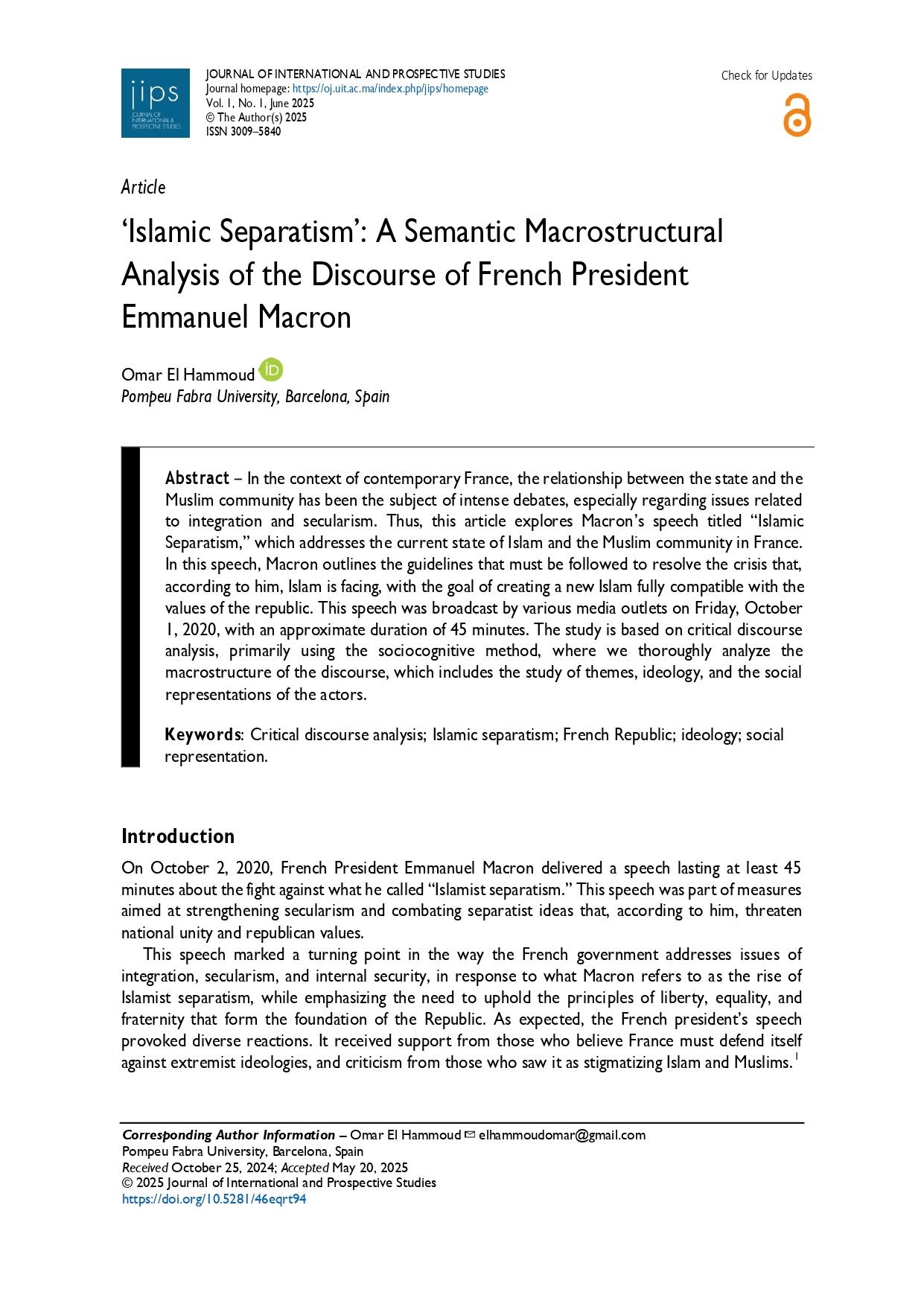‘Islamic Separatism’: A Semantic Macrostructural Analysis of the Discourse of French President Emmanuel Macron
DOI:
https://doi.org/10.5281/46eqrt94Keywords:
Critical discourse analysis, Islamic separatism, French Republic, ideology, social representationAbstract
In the context of contemporary France, the relationship between the state and the Muslim community has been the subject of intense debates, especially regarding issues related to integration and secularism. Thus, this article explores Macron’s speech titled “Islamic Separatism,” which addresses the current state of Islam and the Muslim community in France. In this speech, Macron outlines the guidelines that must be followed to resolve the crisis that, according to him, Islam is facing, with the goal of creating a new Islam fully compatible with the values of the republic. This speech was broadcast by various media outlets on Friday, October 1, 2020, with an approximate duration of 45 minutes. The study is based on critical discourse analysis, primarily using the sociocognitive method, where we thoroughly analyze the macrostructure of the discourse, which includes the study of themes, ideology, and the social representations of the actors.
Downloads
References
Abdel Salam, R. (2022). Dios y el sentido en la era de la modernidad: El discurso entre la hegemonía y la pluralidad.
Agger, B. (1992). The discourse of domination: From the Frankfurt School to postmodernism. Northwestern University Press.
Bin Saeed, A.-M. (2010). Al-Islam wa Al-I’lamwufobiya. Dimashq: Dar Al-Fikr.
Bigo, D. (2002). Security and immigration: Toward a critique of the governmentality of unease. Alternatives: Global, Local, Political, 27(1), 63–92.
Bowen, J. R. (2007). Why the French don’t like headscarves: Islam, the state, and public space. Princeton University Press.
El Karoui, H. (2016). Un Islam de France. Institut Montaigne. https://www.institutmontaigne.org/ressources/pdfs/publications/un-islam-de-france.pdf
Fairclough, N., & Wodak, R. (1997). Critical discourse analysis. In T. A. van Dijk (Ed.), Discourse as social interaction (pp. 258–284). Sage.
Fernando, M. (2014). The republic unsettled: Muslim French and the contradictions of secularism. Duke University Press.
Fukuyama, F. (1992). The end of history and the last man. Free Press.
Hajjat, A., & Mohammed, M. (2013). Islamophobia in France: Past, present, and future. French Politics, Culture & Society, 31(2), 5–25.
Huntington, S. P. (1996). The clash of civilizations and the remaking of world order. Simon & Schuster.
Ibáñez, T., & Íñiguez, L. (Eds.). (1997). Critical social psychology. Sage.
Keaton, T. D. (2006). Muslim girls and the other France: Race, identity politics, and social exclusion. Indiana University Press.
Laurence, J., & Vaisse, J. (2007). Integrating Islam: Political and religious challenges in contemporary France. Brookings Institution Press.
Leiken, R. S. (2012). Europe’s angry Muslims: The revolt of the second generation. Oxford University Press.
Macron, E. (2020, October 2). Discours sur le séparatisme islamiste. Présidence de la République.
Mey, J. L. (1985). Whose language? A study in linguistic pragmatics. John Benjamins Publishing.
Mondon, A. (2013). The mainstreaming of the extreme right in France and Australia: A populist hegemony? Ashgate.
Rabi’, H. (1981). Al-Islam wa al-Quwwa al-Dawliyya. Cairo: Dar al-Mawqif al-Arabi.
Rabaha, S. (1998). L’islam dans l’imaginaire occidental aux sources des discours.
Rasmussen, D. M. (1996). Critical theory and philosophy. Paragon House.
Scott, J. W. (2007). The politics of the veil. Theory and Society, 36(4), 325–341.
Singh, R. (Ed.). (1996). Towards a critical sociolinguistics. John Benjamins Publishing.
Thomas, L. (1993). Beginning syntax. Blackwell.
Turkel, G. (1996). Law and society: Critical approaches. Prentice Hall.
Van Dijk, T. A. (1993). Elite discourse and racism. Sage.
Van Dijk, T. A. (1998). Ideology: A multidisciplinary approach. Sage.
Van Dijk, T. A. (2000). Critical discourse analysis. In D. Schiffrin, D. Tannen, & H. E. Hamilton (Eds.), The handbook of discourse analysis (pp. 352–371). Blackwell.
Van Leeuwen, T. (1996). The representation of social actors. In C. R. Caldas-Coulthard & M. Coulthard (Eds.), Texts and practices: Readings in critical discourse analysis (pp. 32–70). Routledge.
Wodak, R. (1996). Disorders of discourse. Longman.
Wodak, R. (2015). Critical discourse analysis: Discourse-historical approach. In D. Tannen, H. E. Hamilton, & D. Schiffrin (Eds.), The Routledge handbook of discourse analysis (pp. 523–540). Routledge.

Downloads
Published
Issue
Section
License
Copyright (c) 2025 Omar El Hammoud (Author)

This work is licensed under a Creative Commons Attribution-NonCommercial 4.0 International License.

